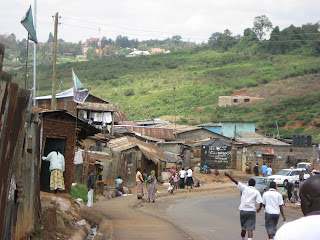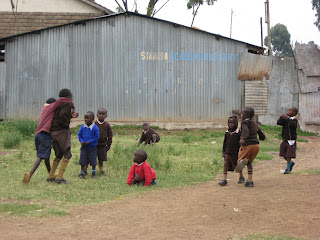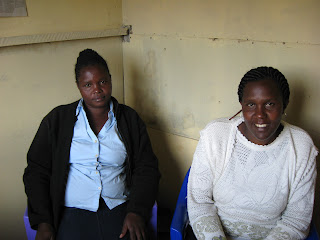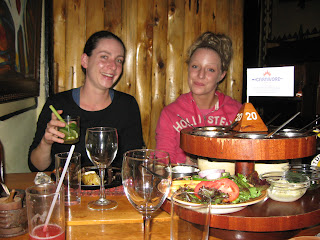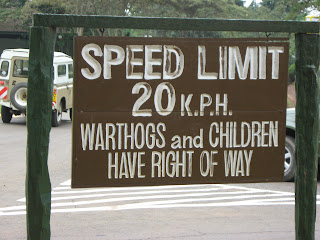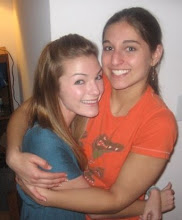
Thankfully the deadline for the NACC Budget Proposal was extended until July 24th, which is good because there would have been no way for me to finish the 15 pages and Josephine hadn't gotten the financial records to turn them in by yesterday. Anyhow, I need to give a recap of last week, and I'll try to be brief. Tuesday was spent making lists of all the things that need to be done for the VCT registration to be complete and I also learned how to make some of the beads used for the necklaces. We cut up old magazines into triangles, roll them, and then apply a clear varnish. One day before I leave we are going to have a support group meeting and spend the entire day making the beads and necklaces with 15 women from the village. I'm going to try and make myself an orange and blue one to wear to the football games this season since I got tickets :)
In the afternoon we went around and visited two families. The first was a lady whose husband left her because she was HIV+ and he was not. They already had 2 children, but he went off and married another women shortly after. He still comes around the wife and kids when he gets lonely, or wants to brag about how his kids all attend good schools even when that is due to outside sponsorship. He may occasionally contribute to the rent or food, but not enough to support his now three children and his first wife. Josephine gave her pictures that a previous volunteer had taken of the women and her children and she seemed to really enjoy them. She wants to move because the sanitation around her one room shack is very bad and she fears for her immunity, but the money isn't there. I forgot to mention that a cholera outbreak has killed over 90 people in the country recently, and I bet the number will continue to climb. The next woman we went to see had an even more tragic story. Her own daughter had died of HIV and left her to raise her granddaughter, but the girl developed mental issues and ran wild after her mothers death to start living on the streets. She does drugs and sleeps around for money and recently gave birth to a baby girl that the subsequently left with the now great-grandmother. The old woman's health is failing so a local orphanage came to take the child. The HIV status of the child will not be known for sure until 18 months, but the old woman just got out of the hospital and has not been able to visit the baby in the orphanage recently. It makes me really upset that some people can be so careless not only with their own lives, but with that of others.
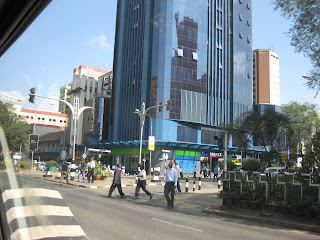 Wednesday was a day of errands and experiencing the ineffective bureaucracy of Kenya. Our first stop was the Dagoretti District Health Center to try and schedule our apointment for VCT inspection and registration. Before the appointment could be scheduled, however, we needed to turn in photocopies of two trained counselors certificates, but that apparently couldn't have been told over the phone. I did get to watch the local regiment march in the field just outside, and it was amusing to here them shout "Right, Left, Right, Left" when they were marching on the wrong foot and then they would realize it and try and hop awkwardly to change. After our first stop, we took a matatu to the District Management Office which was no where near the Health Clinic. The ride took even longer because our matatu driver took a huge detour down an unpaved side street to avoid a police check on the main road. We got dropped of in a more rural area and had to walk 10 minutes up a pretty steep hill to get to the Constituency AIDS Control Council Office. People were milling around outside caring shovels and axes and hoping to get odd landscaping jobs from the government, and there was a line to wait for the man we wished to talk to. It was then we learned that the budget proposals were due on Monday (5 days) and that all the other people here had just found out about the due date through word as mouth as well. He explained the forms to us and said there might be an extension since not even one proposal had been turned in yet. It wasn't surprising to me, because as I read the forms on the matatu back I saw that they required a bank account, financial statements for the past 12 months, 10 pages of written information about how the funding will be used, and 4 more pages of tables and checklists. The English of the documents was wordy and vague even for me, and I can't imagine how a non-native speaker would be able to figure this out. Also the tables had to be typed which requires an advanced knowledge of computers or hiring someone to do it for you. I understand that the government wants to insure that the money they are giving out (350,000 Ksh per chosen organization) is placed in the right hands and will help the most people, but they are really hurting the chances of small, community-based organizations that might not have a large infrastructure or might even be run by someone who hasn't finished school, but saw a need in the community and went to serve. The regulations for registering as a VCT to receive HIV testing kits from the government also poorly communicated and difficult for an organization to achieve. It makes me wonder how much the government is concerned with actually helping the HIV/AIDS crisis, or is just appearing to be concerned enough? In the afternoon, I went to Nakumatt in Karen where I had never been before. It is known as being a rich area full of expats, but the matatu to get there was only 10Ksh. I bought a soccer ball for the kids for about $8 as well as bread, eggs, and some more chocolate for the house and myself. As the rest of the afternoons, I read and wrote in my journal and relaxed until dinner. Then we watched the ever dubbed Spanish soaps that I am embarrassed to admit are starting to grow on me.
Wednesday was a day of errands and experiencing the ineffective bureaucracy of Kenya. Our first stop was the Dagoretti District Health Center to try and schedule our apointment for VCT inspection and registration. Before the appointment could be scheduled, however, we needed to turn in photocopies of two trained counselors certificates, but that apparently couldn't have been told over the phone. I did get to watch the local regiment march in the field just outside, and it was amusing to here them shout "Right, Left, Right, Left" when they were marching on the wrong foot and then they would realize it and try and hop awkwardly to change. After our first stop, we took a matatu to the District Management Office which was no where near the Health Clinic. The ride took even longer because our matatu driver took a huge detour down an unpaved side street to avoid a police check on the main road. We got dropped of in a more rural area and had to walk 10 minutes up a pretty steep hill to get to the Constituency AIDS Control Council Office. People were milling around outside caring shovels and axes and hoping to get odd landscaping jobs from the government, and there was a line to wait for the man we wished to talk to. It was then we learned that the budget proposals were due on Monday (5 days) and that all the other people here had just found out about the due date through word as mouth as well. He explained the forms to us and said there might be an extension since not even one proposal had been turned in yet. It wasn't surprising to me, because as I read the forms on the matatu back I saw that they required a bank account, financial statements for the past 12 months, 10 pages of written information about how the funding will be used, and 4 more pages of tables and checklists. The English of the documents was wordy and vague even for me, and I can't imagine how a non-native speaker would be able to figure this out. Also the tables had to be typed which requires an advanced knowledge of computers or hiring someone to do it for you. I understand that the government wants to insure that the money they are giving out (350,000 Ksh per chosen organization) is placed in the right hands and will help the most people, but they are really hurting the chances of small, community-based organizations that might not have a large infrastructure or might even be run by someone who hasn't finished school, but saw a need in the community and went to serve. The regulations for registering as a VCT to receive HIV testing kits from the government also poorly communicated and difficult for an organization to achieve. It makes me wonder how much the government is concerned with actually helping the HIV/AIDS crisis, or is just appearing to be concerned enough? In the afternoon, I went to Nakumatt in Karen where I had never been before. It is known as being a rich area full of expats, but the matatu to get there was only 10Ksh. I bought a soccer ball for the kids for about $8 as well as bread, eggs, and some more chocolate for the house and myself. As the rest of the afternoons, I read and wrote in my journal and relaxed until dinner. Then we watched the ever dubbed Spanish soaps that I am embarrassed to admit are starting to grow on me. All day Thursday was spent working on the budget proposal due to our deadline. In the morning I helped Josephine structure out the budget and the plans for the Home-Based Care aspects of the program since that is what sector we are applying for funding under. LocalAid would like to hold 5 days seminars to educate caregivers about the resources available to them and avoiding stress twice a year in addition to holding microfinance seminars twice a year to help HIV+ individuals and caregivers start a small business to support their families. Josephine also wants to expand the beading program since it is self-sustaining and start a door-to-door community education project. We broke for lunch and then met at the cyber cafe for 3 hours in the afternoon to type 5 pages of the proposal. It was no where near to being finished, however, and Josephine still needed to arrange the financial reports and open a bank account for the organization. As I was leaving tomorrow morning to go on a safari, I was justifiably worried it would not be completed in time to be turned in by Monday. A little before 5 I wished her home and went back to pack for the weekend.
All day Thursday was spent working on the budget proposal due to our deadline. In the morning I helped Josephine structure out the budget and the plans for the Home-Based Care aspects of the program since that is what sector we are applying for funding under. LocalAid would like to hold 5 days seminars to educate caregivers about the resources available to them and avoiding stress twice a year in addition to holding microfinance seminars twice a year to help HIV+ individuals and caregivers start a small business to support their families. Josephine also wants to expand the beading program since it is self-sustaining and start a door-to-door community education project. We broke for lunch and then met at the cyber cafe for 3 hours in the afternoon to type 5 pages of the proposal. It was no where near to being finished, however, and Josephine still needed to arrange the financial reports and open a bank account for the organization. As I was leaving tomorrow morning to go on a safari, I was justifiably worried it would not be completed in time to be turned in by Monday. A little before 5 I wished her home and went back to pack for the weekend. I woke up at 6:15am on Friday to catch a bus by 7 and be in Nairobi Central by 8am. That was wishful thinking however, as bus after full bus passed me by without stopping. I didn't want to take a matatu because I was traveling by myself and I didn't know where they would drop me off. Finally after 20 minutes I caught the City Hoppa and I made it into town around 8:15. The chatty man that had been sitting next to me helped me find Koinage Street, asked for my number and was denied, and I made it to the VICDA office a little behind Jaye. Lauren took another 45 minutes to get there because her bus broke down. We were to join another safari group since there were only 3 of us, and we met our driver Ken and fellow passenger Adrien, a middle-aged German.
I woke up at 6:15am on Friday to catch a bus by 7 and be in Nairobi Central by 8am. That was wishful thinking however, as bus after full bus passed me by without stopping. I didn't want to take a matatu because I was traveling by myself and I didn't know where they would drop me off. Finally after 20 minutes I caught the City Hoppa and I made it into town around 8:15. The chatty man that had been sitting next to me helped me find Koinage Street, asked for my number and was denied, and I made it to the VICDA office a little behind Jaye. Lauren took another 45 minutes to get there because her bus broke down. We were to join another safari group since there were only 3 of us, and we met our driver Ken and fellow passenger Adrien, a middle-aged German.  We all stopped at Java House because we were starving, and then we set off towards the Great Rift Valley. Two others who were to join us were supposed to meet us along the way since their train from Mombasa arrived late. Our first stop was a view point of the Great Rift Valley, and it was there that I used my first hole-in-the-ground excuse for a toilet. There was a curio shop, but I didn't feel like haggling over prices so I just took photos of the supposed cradle of humanity down below. We set off again after a while and stopped for lunch at a hotel/restaurant in the middle of the valley. The valley is so different from the mountains and is filled with dust, speed bumps, and construction areas that aren't being worked on. After lunch and on the way up the other side of the valley, steam started billowing from the engine of our van. We eventually broke down on the top of the hill from what looked like overheating. The four of us passengers piled out while a helpful local man went to fetch water for the car. Four times over half an hour they filled the tank with water only to have it shoot out in a geyser over the roof of the van and the engine to sputter and die again. After the fifth time while Jaye, Lauren, and I are wandering the embankments along the side of the road, engine stayed running and we reached the town of Narok. While our radiator was being flushed, we got some ancient ice cream sandwiches and looked at more overprices Maasai artifacts.
We all stopped at Java House because we were starving, and then we set off towards the Great Rift Valley. Two others who were to join us were supposed to meet us along the way since their train from Mombasa arrived late. Our first stop was a view point of the Great Rift Valley, and it was there that I used my first hole-in-the-ground excuse for a toilet. There was a curio shop, but I didn't feel like haggling over prices so I just took photos of the supposed cradle of humanity down below. We set off again after a while and stopped for lunch at a hotel/restaurant in the middle of the valley. The valley is so different from the mountains and is filled with dust, speed bumps, and construction areas that aren't being worked on. After lunch and on the way up the other side of the valley, steam started billowing from the engine of our van. We eventually broke down on the top of the hill from what looked like overheating. The four of us passengers piled out while a helpful local man went to fetch water for the car. Four times over half an hour they filled the tank with water only to have it shoot out in a geyser over the roof of the van and the engine to sputter and die again. After the fifth time while Jaye, Lauren, and I are wandering the embankments along the side of the road, engine stayed running and we reached the town of Narok. While our radiator was being flushed, we got some ancient ice cream sandwiches and looked at more overprices Maasai artifacts.  Eventually we set off, and Ken was determined to make up time so we made our evening game drive at Masai Mara Game Reserve. Unfortunately, this meant speeding over potholes and unpaved roads in the middle of no where. The only sites outside the window were tiny Maasai villages, herds of cattle, and scrub brush. I was surprised that our van held up so well crossing tiny bridges and going up dirt hills, but we made it at the safari company's tented camp around 5:15pm. The other van with our companions who were late had actually arrived in front of us, but they climbed into our van and we were introduced to Storm and Sophie, British students on their gap year.
Eventually we set off, and Ken was determined to make up time so we made our evening game drive at Masai Mara Game Reserve. Unfortunately, this meant speeding over potholes and unpaved roads in the middle of no where. The only sites outside the window were tiny Maasai villages, herds of cattle, and scrub brush. I was surprised that our van held up so well crossing tiny bridges and going up dirt hills, but we made it at the safari company's tented camp around 5:15pm. The other van with our companions who were late had actually arrived in front of us, but they climbed into our van and we were introduced to Storm and Sophie, British students on their gap year. 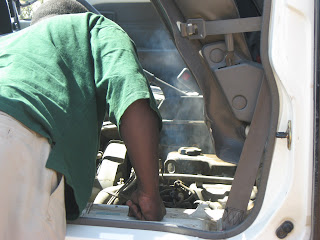 Ken then drove us right into the park and of course there was a herd of zebra right in front of the road. We were so excited until we rounded the corner and saw many more zebra, impalas, dik diks, hartebeast, wildebeast, Thompson's gazelle, and a pair of African crown cranes. A group of white safari vans were congregating around something exciting, so as we drove near we saw that it was a pack of 4 lionesses. They must have been going off to hunt and we stayed and took pictures for a while. They were very unperturbed by all the strange vehicles surrounding them and eventually slunk off into the bush. Next we saw a small group of giraffes and a lone male elephant. I of course took about 20 pictures of this one elephant, but it made being jostled around in the back seat of the van all day worthwhile. Adrien mentioned a rumor of Sir Richard Branson touring the Mara as well this weekend and we all made jokes about finding the elusive Richard Branson lurking near the watering hole.
Ken then drove us right into the park and of course there was a herd of zebra right in front of the road. We were so excited until we rounded the corner and saw many more zebra, impalas, dik diks, hartebeast, wildebeast, Thompson's gazelle, and a pair of African crown cranes. A group of white safari vans were congregating around something exciting, so as we drove near we saw that it was a pack of 4 lionesses. They must have been going off to hunt and we stayed and took pictures for a while. They were very unperturbed by all the strange vehicles surrounding them and eventually slunk off into the bush. Next we saw a small group of giraffes and a lone male elephant. I of course took about 20 pictures of this one elephant, but it made being jostled around in the back seat of the van all day worthwhile. Adrien mentioned a rumor of Sir Richard Branson touring the Mara as well this weekend and we all made jokes about finding the elusive Richard Branson lurking near the watering hole.  We headed back around 6:30pm when it was getting dark, and dinner at the camp was a delicious mixture of chapatti, beef, rice, coleslaw, and warm potato salad. The tents in which we were staying were thankfully not really like camping at all. Lauren, Jaye, and I each had our own twin bed and mosquito net, and there was a concrete bathroom right behind the tent where we had a hot shower and flushing toilet. We agreed to meet for our all-day game drive after 7am breakfast the next morning and headed off to sleep after a long day of sitting in a car. I will have to write about the rest of the weekend and how teaching went today sometime soon.
We headed back around 6:30pm when it was getting dark, and dinner at the camp was a delicious mixture of chapatti, beef, rice, coleslaw, and warm potato salad. The tents in which we were staying were thankfully not really like camping at all. Lauren, Jaye, and I each had our own twin bed and mosquito net, and there was a concrete bathroom right behind the tent where we had a hot shower and flushing toilet. We agreed to meet for our all-day game drive after 7am breakfast the next morning and headed off to sleep after a long day of sitting in a car. I will have to write about the rest of the weekend and how teaching went today sometime soon.  I also plan on making real southern cornbread with Margaret sometime this week so I'll let you know how that all goes. Love you all and see you soon!
I also plan on making real southern cornbread with Margaret sometime this week so I'll let you know how that all goes. Love you all and see you soon!


